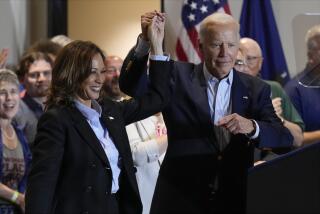Making Steel Pay Its Way at the New USX
- Share via
United States Steel Corp., one of American industry’s most perplexing and yet fascinating companies, and its controversial chairman, David M. Roderick, are at it again.
Last week, U.S. Steel announced that it was changing its name to USX Corp. and making the steel business, on which the corporation was founded 85 years ago, one of four separate divisions in a new holding company structure.
Roderick, who has led the company since 1979, explained that he made the move to force the steel business to pay its own bills, finance its own modernization. “Over the past five years, the steel division has been a major cost to the corporation,” he said.
U.S. Steel in March released a study by the Price Waterhouse accounting firm showing that if steel operations had been independent since 1980, they would have shown pretax losses of $2.4 billion.
The reason such figures never appeared in a U.S. Steel annual report was that some steel costs were absorbed by other company operations, such as oil and gas, chemicals and engineering.
Entire Industry in Trouble
Which is interesting, no doubt. But the point is a little unclear. Nobody doubts that the steel business has been in trouble, at this company as at every other. Roderick, after all, has closed down more than 150 plants and laid off about 100,000 people in an attempt to shrink Big Steel’s operations to a size at which they can be profitable.
Last year, steel accounted for one-third of U.S. Steel’s $19.3 billion in sales and 2% of its pretax income--the bulk of the profit coming from oil and gas.
But that was the way Roderick planned it in 1982, when he acquired Marathon Oil for $5.9 billion. Oil would provide the cash flow to see the company through the wrenching transitions in steel, an industry with massive worldwide overcapacity in which American producers--even with an assist from import quotas--managed to ship only 69% of their capability last year.
Roderick was roundly criticized for putting money into oil instead of steel at the time of the Marathon acquisition. But lately even Lynn Williams, president of the United Steelworkers, compliments him for it. “The Marathon purchase enabled them to do some things in terms of modernizing steel plants that companies which are entirely in steel have trouble doing,” Williams said in a recent interview in Inc. magazine.
Short-Term Tactics
Roderick also, in his annual reports, has been telling shareholders of the “revitalization of our steel sector.”
So why make this big deal about steel now? The short-term reason is tactical. USX wants to show Williams how troubled the business is because it wants steep wage and work rule concessions in labor contract negotiations this month. The union wants improved job security, and both sides seem prepared for a strike when the old three-year contract expires July 31.
But down the road, in a year or two perhaps, there is a real possibility that the steel division will be somehow spun off as a separate company with public shareholders and union members such as Williams on the board of directors.
There is speculation to that effect today, and support for the idea. “It would enhance shareholder value,” says analyst Richard McClow of Chicago’s Duff & Phelps research firm. USX, selling currently at under $20 a share, sold at three times that price back in the 1970s.
The idea is fascinating, beyond the stock market’s enthusiasm for new issues, because--like so much of the Pittsburgh giant’s recent history--it makes you ponder the purpose of the corporation in society.
Roderick in buying Marathon in 1982 and Texas Oil & Gas last year (short term, at least, his timing is atrocious) takes the position that the corporation is an independent economic entity whose existence transcends specific products or industries.
Williams, a tough and shrewd union leader, doesn’t disagree with that position. But he holds that employees should have more of a say in running such an economic entity.
Last year, Williams established in court that a bankrupt company’s creditors include its employees, and as a result he sits on the board of Wheeling-Pittsburgh Steel Corp. He faults steel managers for not having reacted quickly enough to the overcapacity and diminished steel usage that threatened their business.
Roderick, no doubt, would counter that one of the mistakes that steel managers made, back in the 1960s, was to give away the store to the United Steelworkers, whose pay is now double that of Japanese steelworkers.
How these two adversaries--neither of whom has any illusions about labor-management “cooperation”--work out the destiny of USX’s 85-year-old steel business in the next few years will have significance beyond standard wage negotiations.
More to Read
Inside the business of entertainment
The Wide Shot brings you news, analysis and insights on everything from streaming wars to production — and what it all means for the future.
You may occasionally receive promotional content from the Los Angeles Times.










